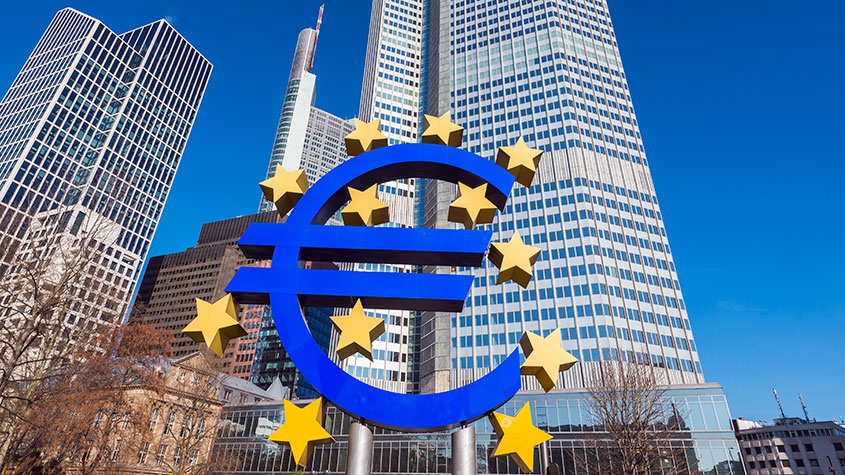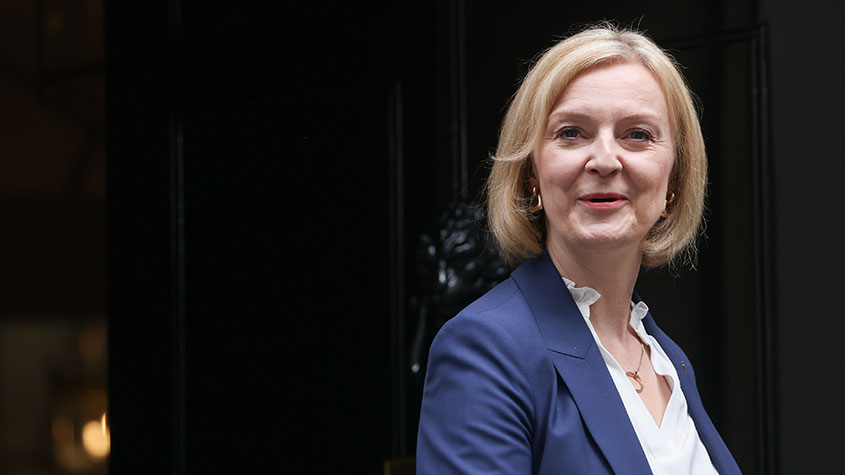Bernard Connolly: The man who predicted the euro crisis
Europe has just about survived its recent traumas, but it is not out of trouble yet. Bernard Connolly, who saw all this coming back in 1995, talks to Merryn Somerset Webb.

Get the latest financial news, insights and expert analysis from our award-winning MoneyWeek team, to help you understand what really matters when it comes to your finances.
You are now subscribed
Your newsletter sign-up was successful
Want to add more newsletters?

Twice daily
MoneyWeek
Get the latest financial news, insights and expert analysis from our award-winning MoneyWeek team, to help you understand what really matters when it comes to your finances.

Four times a week
Look After My Bills
Sign up to our free money-saving newsletter, filled with the latest news and expert advice to help you find the best tips and deals for managing your bills. Start saving today!
When Bernard Connolly wrote his book The Rotten Heart of Europe nearly 18 years ago, you could pick up a copy for a few pounds. If you'd tried to buy one as a Christmas present last year, you would have had to fork out more like £1,000. Why? Because Connolly was right.
His 1995 book (reissued this month) pointed out the underlying flaws in the idea of a European monetary union, called it a threat to freedom and democracy, and predicted a nasty endgame. As this began to happen, the price of the book began to rise. I wonder if any of this surprises him?
It doesn't. The Rotten Heart of Europe may look prophetic, but "it was really stating the bleeding obvious". It's just that, back then, "lots of people didn't want to see or recognise the bleeding obvious". Now they have to.
MoneyWeek
Subscribe to MoneyWeek today and get your first six magazine issues absolutely FREE

Sign up to Money Morning
Don't miss the latest investment and personal finances news, market analysis, plus money-saving tips with our free twice-daily newsletter
Don't miss the latest investment and personal finances news, market analysis, plus money-saving tips with our free twice-daily newsletter
Has the eurozone been a mess in the way he expected? Completely. It was "badly constructed", because the people who constructed it didn't care about economics, only about politics. The plan from day one was to "put in place a mechanism" that would force Europe's countries into a political union. Anyone who doesn't believe that must believe instead that "these people were so blind, incompetent, and stupid that they should never have been allowed to be in charge of a whelk stall".
What will happen next? If you want the euro to hold, there are two routes: the German route of a fiscal union "in which the Germans set rules that everyone else has to follow"; or a transfer union in which everyone else "puts their hands in Germany's pocket". You can't have both.
Of course, the Germans might accept the idea of making transfers to other countries as long as "they made the rules work in such a way that there would never be a need for transfers". How might that work? I ask. It probably couldn't there may even in principle "be no economic solution" to the euro problem but that won't stop Germany thinking it could.
The key to grasping this, says Connolly, is to look not at government finances (as we mostly do), but at each nation's balance sheet (the current account). If you want to make things work, you have to find a way to balance the current account with full employment.
Spain has almost eliminated its current-account deficit (brought its imports down to a level similar to its exports). But this has been more about crushing internal demand than growing exports hence the 27% unemployment. So there is still a huge "full-employment current-account deficit".
To sort that out, you must balance this compression of demand with improving competitiveness so that more Spanish goods are consumed internally and externally. Normally this is straightforward: your currency falls and the job is done. In a monetary union you end up with "internal devaluation" (basically a nasty euphemism for forcing down wages, which pushes up the real value of debt along the way).
But even if this was possible and given the social unrest it comes with, it may not be there's no saying that it can work. The process of internal devaluation pushes down internal demand further and "as you depress demand more, you need to improve competitiveness more to restore growth in employment". You can get to the point "under which this process never converges". It just spirals down. That's why residential mortgage arrears are rising fast and unemployment has quadrupled.
Things will get a lot worse. The path of long-term unemployment "the deer moving through the snake" is very disturbing. However strong family networks are, and "however hard your granny or your auntie tries to pay your mortgage for you", eventually it can't be done. If we keep on this path, "mortgages will become simply impossible to service in Spain".
There is also a huge oversupply of houses, to the extent that "it's been very hard to believe the official data onprices over the last few years". The upshot is that Spain is in "deep trouble". There has been no real improvement in the full-employment current-account deficit since 2007/2008. "They are not going to be able to do it." The recent optimism about Spanish banks? "Delusional."
I wonder, when it seems so clear that internal devaluation is so unlikely to work, why the Germans are pushing so hard for more of it. "They understand monetary union less well than just about anyone else." Perhaps they are blinded by how well it has worked for Germany? It has worked well "for some people", says Connolly.
It has worked for exporters, and for the banks during the boom, when they lent everyone else the money to buy German products. It effectively became a vendor-financing operation to the rest of Europe. But while German exporters are still fine, the banks aren't doing so well.
Is there any way out? What if he were in charge? Spain would have to leave. You "could imagine there being a northern block of the surplus countries of Germany, the Netherlands, Finland, Austria". A northern currency would soar, but at least Germany wouldn't face "having to dole out 10% of its GDP every year" in a transfer union. And it could deal with the rising currency by stimulating domestic demand which would help with the "global adjustment process".
The problem is France, which hasn't got a current-account surplus and does have a "competitiveness problem". Economically, it can't live with the German block, but it is unlikely to end up leading a "rival Latin block" either. That's why France is "so desperate to keep all the others in" and hang on to the myth that it holds some power within the union as it stands.
So it is really France that is working to hold the union together? "Yes," says Connolly. But it can't. "Who knows how long it takes", but in the end the weaker members "have to go". Would it help for the European Central Bank (ECB) to loosen monetary policy? "They have already done so to a considerable degree." You can't get Spain, Portugal, Greece, and "even France" into balance without "destroying their economies", so in the end you have two choices: "you can recreate the bubble, or you have the transfer union".
It is clear that, if it must, Germany would prefer to "recreate the bubble through the ECB". But this can never be more than a stop-gap. One day "the bubble becomes the economy there is no productive capital left", and the Ponzi scheme of constantly loosening monetary policy ends.
I ask about his idea that monetary union is a threat to freedom and peace. He doesn't, he says, mean there are likely to be "Panzer battles on the plains". Instead, he sees the union as part of a "deliberate attempt to break down a political sense of national identity". It is this that he sees ending in social unrest.
Human beings need a "focus of belonging". If they don't get it via their nation, they end up "viewing themselves as belonging to a religious sect or a racial or linguistic group". You "can't have a civilised, peaceful democratic society on that basis". The EU, in "attempting to destroy traditional structures, institutions and modes of thought", is "destroying civilisation".
Our meeting took place just before David Cameron's big Europe speech. Does Connolly see any point in the EU for Britain? Not really. If you go back to the start, you can see why people thought it made sense for Britain to be in the single market. But look again today and it isn't clear.
"In the late 1950s, there were protectionist barriers everywhere." It was an "explicitly, aggressively protectionist system". That's not the case now. So the external environment has changed to our advantage. And the internal? Massively to our disadvantage. The EU is stealing freedom and destroying civilisation: the endless "stupid rules" and the sacrifice of our democracy are too big a price to pay. "If we started now, we certainly wouldn't join." So why stay?
Who is Bernard Connolly?
Oxford-educated economist Bernard Connolly made headlines when he lost his job at the European Commission in 1995, after writing The Rotten Heart of Europe: The Dirty War for Europe's Money. The book (now re-issued by Faber & Faber, price £14.99) attacked the European Exchange-Rate Mechanism (the euro's precursor), arguing it was part of a plan to force a greater degree of political and economic integration than popular opinion would support.
The Times's Anatole Kaletsky called the book "the most intellectually persuasive, economically coherent and politically prescient account yet published of the development of European institutions in the 1990s". In 2001, Connolly received the Frde Jakobsen prize, awarded in Denmark for outstanding moral courage in public affairs'.
After a predictably unsuccessful complaint against the European Commission in the European Court of Justice, Connolly joined AIG Trading Group. After 11 years working for AIG units, he went on to found economics consultancy Connolly Insight, where his analysis is highly sought-after. Future Bank of England head Mark Carney specifically mentioned him as one of the very few economists to predict the global financial crisis.
Get the latest financial news, insights and expert analysis from our award-winning MoneyWeek team, to help you understand what really matters when it comes to your finances.

-
 Average UK house price reaches £300,000 for first time, Halifax says
Average UK house price reaches £300,000 for first time, Halifax saysWhile the average house price has topped £300k, regional disparities still remain, Halifax finds.
-
 Barings Emerging Europe trust bounces back from Russia woes
Barings Emerging Europe trust bounces back from Russia woesBarings Emerging Europe trust has added the Middle East and Africa to its mandate, delivering a strong recovery, says Max King
-
 No peace dividend in Trump's Ukraine plan
No peace dividend in Trump's Ukraine planOpinion An end to fighting in Ukraine will hurt defence shares in the short term, but the boom is likely to continue given US isolationism, says Matthew Lynn
-
 Europe’s new single stock market is no panacea
Europe’s new single stock market is no panaceaOpinion It is hard to see how a single European stock exchange will fix anything. Friedrich Merz is trying his hand at a failed strategy, says Matthew Lynn
-
 Britain’s inflation problem
Britain’s inflation problemInflation in the UK appears to be remaining higher for longer when compared with similar rich countries. Why? And when can we expect a return to normal? Simon Wilson reports.
-
 Eurozone inflation hits 10.7% in October
Eurozone inflation hits 10.7% in OctoberNews Inflation across the eurozone hit 10.7% in October. What does it mean for your money?
-
 A forgotten lesson on the dangers of energy price caps
A forgotten lesson on the dangers of energy price capsAnalysis Liz Truss’s proposed energy price cap is an ambitious gamble. But a similar programme in Spain ended up being a fiasco, say Max King and Tom Murley. Here, they explain why Truss’s plan could be doomed to failure.
-
 Don't be scared by economic forecasting
Don't be scared by economic forecastingEditor's letter The Bank of England warned last week the UK will tip into recession this year. But predictions about stockmarkets, earnings or macroeconomic trends can be safely ignored, says Andrew Van Sickle.
-
 The wolf returns to the eurozone’s door
The wolf returns to the eurozone’s doorEditor's letter The eurozone’s intrinsic flaws have been exposed again as investors’ fears about Italy’s ability to pay its debt sends bond yields soaring.
-
 Eurozone economy heads for paralysis
Eurozone economy heads for paralysisNews Record high energy prices, the threat of recession in Germany and squabbling in Italy's government has left the eurozone fighting fires on all fronts.